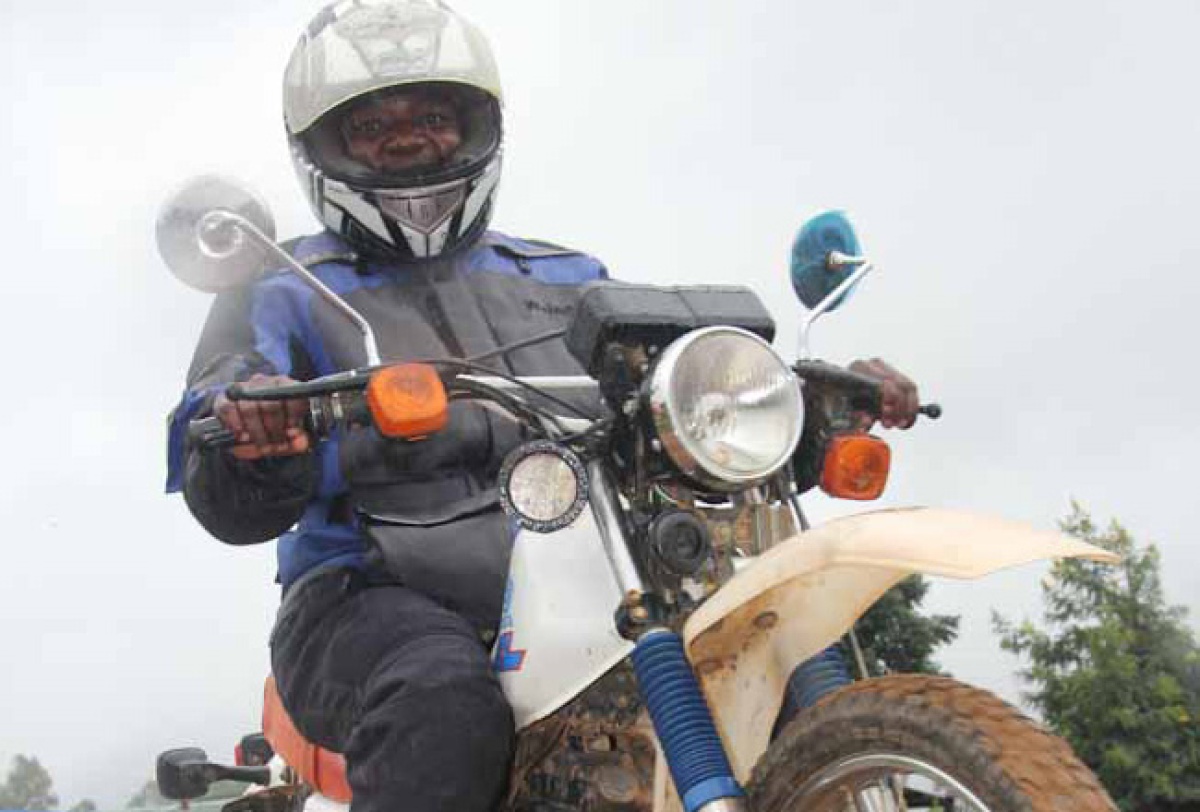Health on Wheels: How Dirt Bikes Help Hard-to-Reach Patients in Malawi
Posted on Mar 18, 2013

Charles Phiri was stuck in one of Malawi’s notorious downpours, steering a Honda XL dirt bike down a washed-out mountain road. Rain streaked across his visor. With every twist of the throttle, globs of mud splattered against his protective jacket.
“My most difficult ride,” Phiri, 30, recalls of the rain-soaked trip to Benje, a hard-to-reach village near the border of Mozambique. “[But] these patients would die if there was not someone to go out and visit them and encourage them to get back on treatment.”
As an HIV Treatment Coordinator for Partners In Health’s Malawian sister organization Abwenzi Pa Za Umoyo (APZU), Phiri spends countless hours traversing the Neno district to consult patients who’ve stopped taking their antiretroviral therapy. It’s a job that has become more demanding in recent years: In Malawi—the seventh poorest country in the world—approximately one in every 10 adults is living with HIV. In 2006, the year before PIH began working in Neno, only five HIV-positive people in the district were being treated with antiretrovirals. By the end of 2012, more than 5,000 people had access to the lifesaving drugs.
Phiri is a critical link in the chain of health care providers who help patients adhere to their daily regimen of pills by making home visits. “I talk to them about their lives, about why they have stopped their treatment,” he says. “I talk to them about the consequences of stopping treatment.”
Though remarkable in its simplicity, this approach works. Research from PIH-supported programs in Rwanda has shown that similar community-based care not only leads to higher retention and adherence rates among patients—meaning they stay in care longer and are more apt to take their drugs on time—it helps identify issues such as food insecurities and depression, factors that may compel people to stop taking medication.
But long distances between patients, not to mention inclement weather and few paved roads, pose challenges. To help Phiri and others reach patients in a timely manner, PIH/APZU teamed up with the nonprofit Riders For Health, which secured a handful of Yamaha AG 200s and Honda XLs—lightweight dirt bikes that are ideal for Neno’s terrain. Now the bikes allow PIH/APZU to cover nearly 7,000 kilometers each month.
Among the most tangible benefits of the bikes is that they’re far cheaper than larger, less fuel-efficient trucks. Every kilometer traveled in a truck costs 80 cents compared with 30 cents for a dirt bike. And the bikes are cheaper to obtain. Whereas a truck could costs tens of thousands of dollars, a dirt bike and the necessary training for one rider is only $5,550.
“The bikes help free up our limited fleet of cars and cut down on gasoline costs,” Victoria Smith, external relations coordinator for PIH/APZU, said. “There are so few paved roads in Neno—for the most part the roads are packed earth and rock, and many of the routes to get to patients’ homes are mountain trails that intersect with rivers, fallen trees, and rocky hills.”
While all riders are equipped with a full-face helmet and protective gloves, jackets, and pants, the goal is to make sure these items are last-resort defenses. Before anyone jumps on a bike and heads into the field, they must pass a two-week training course with Road Safe, a Malawian driving school. After that, they enter a one-week program facilitated by Riders For Health that’s led by a retired professional long-distance motorcycle racer.
According to Phiri, the trainings instill a high level of confidence. “I never thought I was going to fall off,” he says when talking about the ride to Benje. “The road was muddy and windy, and I managed to stay on the whole time.”
With numerous riders trained, we’re now leveraging the nimbleness of the bikes to identify treatment gaps in Neno. Take for example PIH/APZU’s Geographic Information Systems Assistant William Mwale, who led a recent expedition to plot the precise locations of villages where the hardest-to-reach chronic-care patients live.
By cross-referencing the locations with patient data from an open-source electronic medical record system, PIH/APZU was able to build maps and measure the proximity of existing health centers to patients. The maps identify underserved areas where physical and/or socioeconomic barriers are likely to prevent people from accessing care.
And the dirt bikes help us get around at least some of those barriers.

